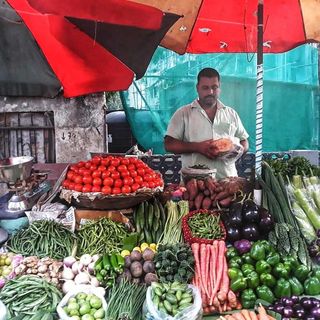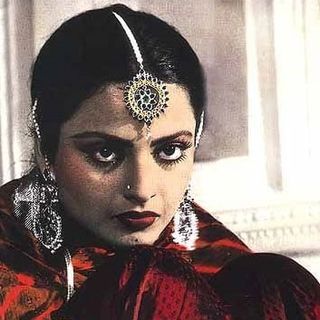
Little Big Things: The 30‑Year‑Old Wiccan Priestess
When you become a Wiccan witch, you have one golden rule in your life: Do as you will, harm none.
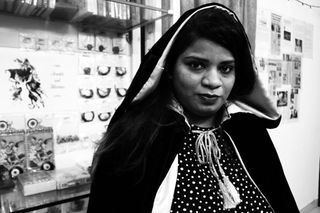
In Little Big Things, we bring you stories of people who have rejected conformity and achieved success on their own terms.
Sonal Bhosle, 30, grew up in a conservative Indian household in Mahim, Mumbai. Playing second-fiddle to her younger brother, who was given more attention by her parents, being constantly fat-shamed by her mother, feeling the pressure to be married in her 20s, being dominated by the men in her life — these were everyday realities for Bhosle.
That is, until she became a Wiccan priestess.
“When you see witches, you will find they’re mostly women. It’s a goddess-dominated religion. In Indian religions, the man comes first, the woman comes behind him,” Bhosle says. “With Wicca, when people dominate you outside, and you come to know how powerful you really are on the inside, you don’t allow them to dominate you. That changes your life.”
In January 2017, Bhosle lost her father to a sudden accident. 45 days later, she found out her partner of three years had been cheating on her. She had given up on life and was contemplating suicide when she received an invite to attend the opening of a friend’s new Wiccan shop. Bhosle had dabbled intermittently in spells she had picked up from Google to satisfy her own curiosity for the religion — she once lit a bay leaf on fire to get a good outcome from a job interview (it didn’t work because the bay leaf was broken, Bhosle laments). But she had very little knowledge of Wicca as a religion or of its values. When she met her friend, Wiccan high priest Angel Serrao, at the opening, she says he told her not to go through with whatever she was planning, but to return to the shop the next day. Little did she know, Serrao hadn’t just prevented her from killing herself, but opened up a whole new trajectory for her life.
At the shop, which includes a Wiccan altar on the second floor, Bhosle encountered many people exasperated with their lives and looking for magical solutions — for relationship troubles, for family feuds, or simply for more money. While her education with the various herbs, potions, and Wiccan history and literature progressed — the Wiccan shop is now a proto-temple, or temple-in-progress, as certified from a coven in the U.S. — Bhosle became a healer of sorts for the shop’s clients.
Related on The Swaddle:
Reimagining Witchcraft as a Refuge for Marginalized Groups
“The magic part of it is how you manifest your own energy and translate it to positivity. With the herbs, crystals, it adds more power to your own energy. If you are positive about your own energy, I think anybody can do it,” Bhosle says. Wands, or pointed hats, for example, are merely tools to focus positive energies; practicing witches can easily do without, she adds. In her personal life, the more she learned about Wicca, the less she grew concerned about material things, Bhosle says. “When you start practicing, you come on that level as to what is mundane, what is spiritual, what you don’t need to run behind.”
For the people who come to her for help, Bhosle follows one mantra: “Do as you will, harm none.” When people think of Wicca and witches, they think it’s all just spells and voodoo and dark magic, Bhosle says, but that’s far from true. “We have herbs, we have planets, we have the Earth’s elements — we use the magical as well as scientific properties of these things to help people grow,” she says. “I try to understand what qualities exactly the person lacks, or what they have in abundance and are not using, and try to give them the energy they need to help themselves. … When you work both with magic and logic, you get better results,” she says, adding the herbs and crystals are also optional tools to help channel positive energies.
“I always believe in karma. I won’t harm you, because otherwise, the harm will come back threefold. I don’t do dark magic. In the end, it’s all about power. We select politicians and give them power — now, depending on their nature, we find out if they used the power for good or bad,” Bhosle says. “Magic doesn’t have a color; it’s just a tool. It’s a knife to cut through something. Now, whether you want to cut a vegetable or a human being is up to you.”
Bhosle’s favorite spell is a banishing spell, she says — hold a black candle in your hand and think of all the native thoughts bothering you. Light the candle, and let the thoughts drip away with the wax, she instructs. The key here is not to think about those thoughts, or the spell again, but to believe it has worked, she says.
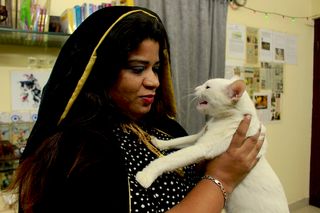
Sonal Bhosle, 30 with her cat, Freya, who she believes bears the soul of a dead witch. (Image Credit: Rajvi Desai)
For Bhosle, personally, Wicca has helped to achieve freedom. “It’s a religion, but there are no rules. In other religions, if you’re on your period, you can’t go into temples. On certain days, you can’t eat non-vegetarian food. But Wicca believes everyone has a god or goddess in them. Before praying to anyone else, we need to pray to ourselves, and for that, we need to be free,” Bhosle says. “For when a woman is on her period, she’s the most powerful being in the world.”
Wicca has also helped her be more tolerant of people, and attempt to love them unconditionally. “Wicca has changed my life completely. You understand what your life path is. Even if somebody’s hating on you, you can be good to the person. Save your own karma,” Bhosle says. “At the same time, you should do what makes you happy. That’s the only way to manifest positive energy.”
Rajvi Desai is The Swaddle's Culture Editor. After graduating from NYU as a Journalism and Politics major, she covered breaking news and politics in New York City, and dabbled in design and entertainment journalism. Back in the homeland, she's interested in tackling beauty, sports, politics and human rights in her gender-focused writing, while also co-managing The Swaddle Team's podcast, Respectfully Disagree.
Related

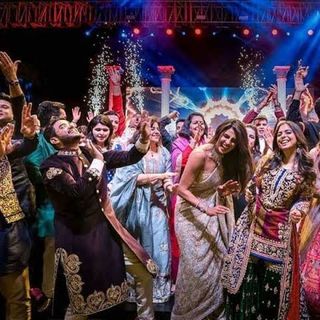
The Buzz Cut: Nick Jonas, PC Add Competition to Weddings With Sangeet‑Themed Reality Show
